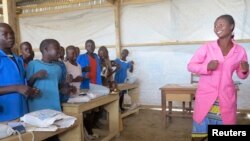October 5 is World Teachers Day, set aside to mobilize support and to ensure that the needs of future generations will be met by teachers. Some teachers, who work with Central African refugees in camps in eastern Cameroon or on the border with Central African Republic (C.A.R.), face especially difficult challenges.
Emmanuel Mbiydzenyuy asks students to be quiet and follow English language classes here at the government school in Dhahong in eastern Cameroon. Eighty of the 110 students in one class are Central African Republic refugee children. The C.A.R. students know French, but are trained in both French and English in these Cameroonian schools.
"It’s difficult. You get into a class. You see children who can not express themselves in English. At times you use terms in class and they are like sir, what does that mean, we have never heard that word, because at home their parents are Francophones. They speak [nothing] but French. In school that is when they can even manage to speak the English language and even among themselves, they speak but the French language," said Mbiydzenyuy.
Belingack Christophe fled violence in Bangui, C.A.R.'s capital, last year, and is now the brightest English student in his class.
He said he is now able to say certain things in English, for example that his name is Belinga or that he is hungry, thanks to his English language teacher.
Mbiydzenyuy is the lone English language teacher in the school with an enrollment of 1,350 students. He said most of the refugee children attend classes only once in a while as they struggle for survival.
"They are hawkers, night hawkers by the road side. They sell bread in order to pay for their fees and other school needs. At times you are even with children in class they don't have uniforms, when you are asking, they say my father does not have. Even in class they are unable to study because they will tell you they are hungry, they have not eaten since morning," he said.
Cameroon teachers face enormous challenges. They are often transferred to difficult to access areas after training and at times go for months without salaries. Some work in congested classrooms and others have to grapple with insecurity in areas like eastern Cameroon. Cameroon Teachers Trade Union (CATU) Secretary-General Tassang Wilfred said that despite the challenges, many of them are committed to the work.
"We send out a clarion call for teachers to love the profession and to teach the children the nation has put at their disposal with all their energy in spite of the very sometimes harsh conditions in which most of us have to work because if we continue to look on our pay package and the conditions in which we work for some of us in some areas we would not do the work. So with this kind of thing we look at the plight of children, their future seems bleak," said Wilfred.
Cameroon reports that at least 5,000 of its teachers have not agreed to work under difficult conditions and are seeking "greener pastures" in Europe. The secretary-general in Cameroon's Ministry of Secondary Education, Professor Ivo Leke Tambo told VOA the government is hoping groups and organizations outside the government can help.
"The state alone is not able to guarantee the employment of enough teachers for the number of children that we have to take care of. The policy of the government is let schools be created and let all the children have access to education but education is not only the responsibility of the state. The state does the bulk of the work but the educational community, NGOs and so on are also called upon to support the government in meeting the requirements of education," said Tambo.
UNESCO says that despite Cameroon's efforts, there are more than 53,000 CAR refugee children in Cameroon who lack schools and teachers.
The theme of this year's World Teachers Day in Cameroon is empowering teachers and building sustainable societies.




